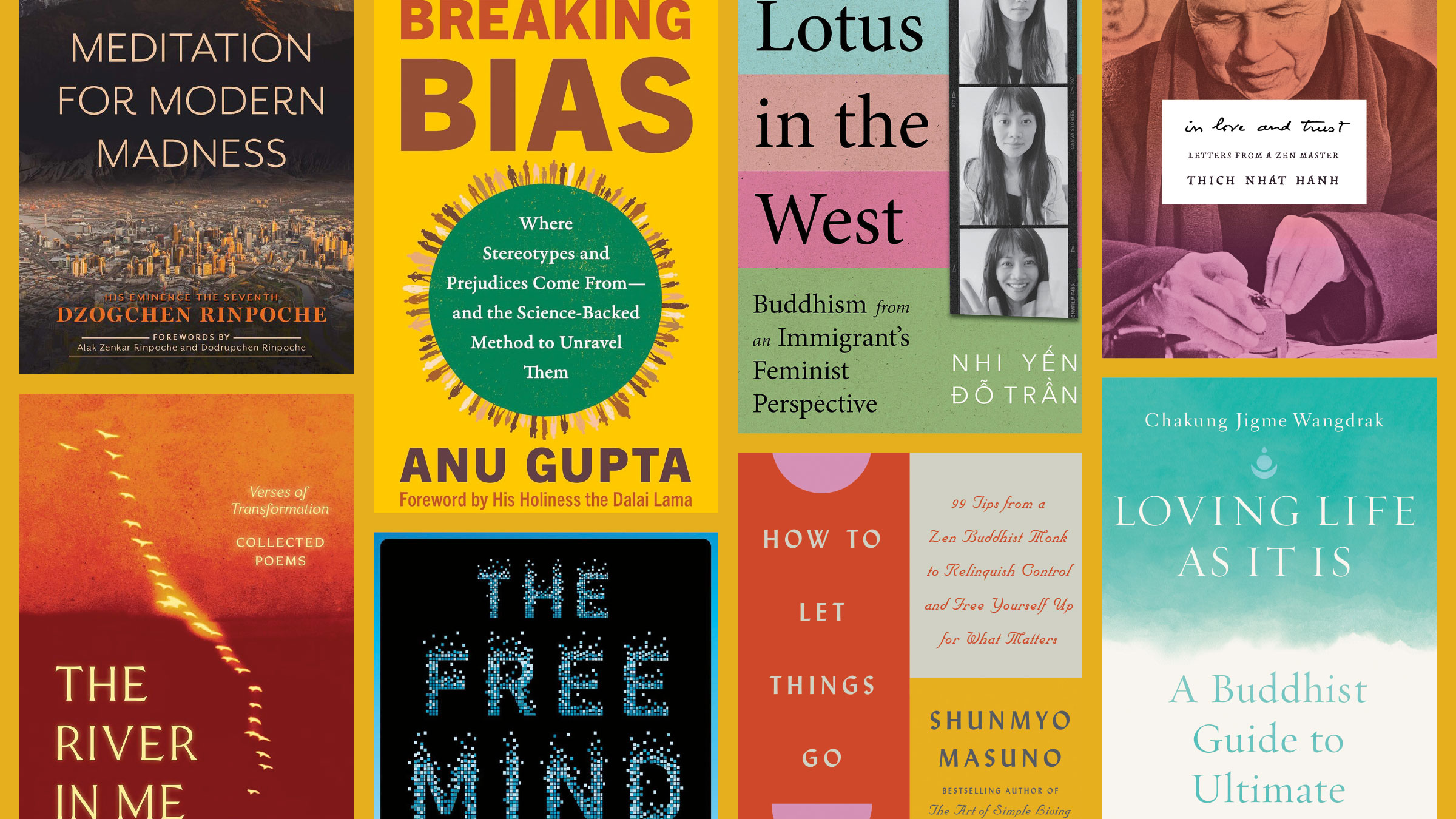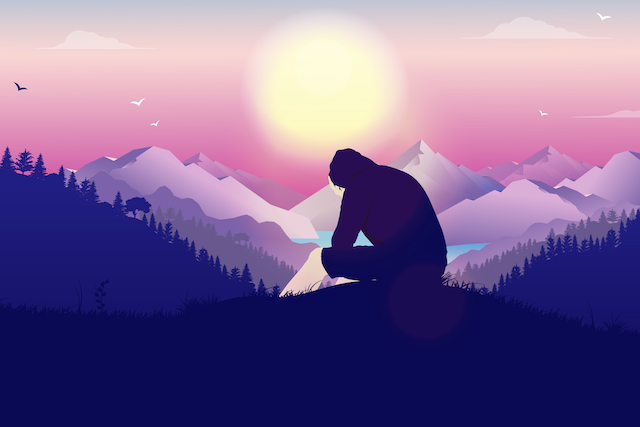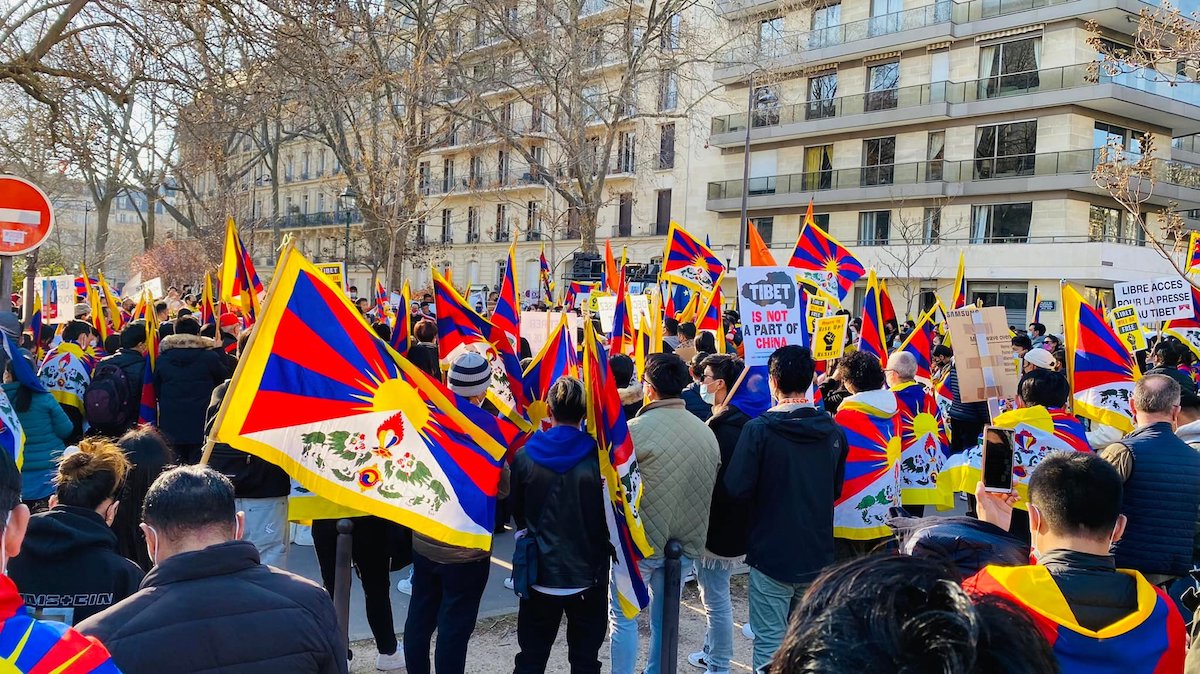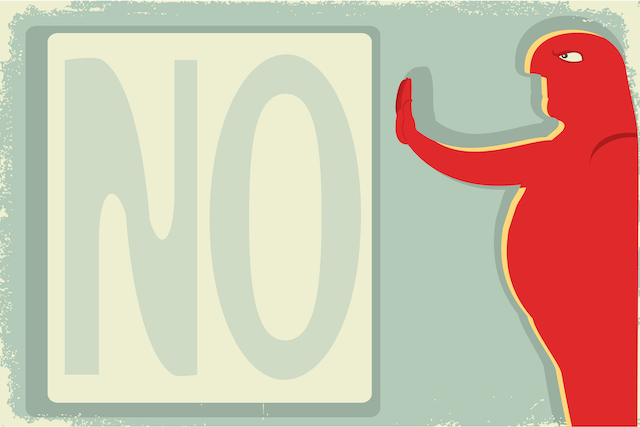Books in Brief: November 2024
Sandi Rankaduwa reviews eight inspiring new books by authors of Asian descent. The post Books in Brief: November 2024 appeared first on Lion’s Roar.

In Meditation for Modern Madness (Wisdom Publications), the Seventh Dzogchen Rinpoche, Jigme Losel Wangpo, offers teachings that he feels have all too often been confined to Tibetan Buddhist monasteries. He brings the wisdom of Dzogchen into contemporary lay life by describing it as “an ancient form of common sense.” He says we often overlook our inherent, unchangeable perfection, but meditation can help us cultivate awareness of it. Key practices like shamatha and vipashyana are explored, as is the practice of trading the three times (past, present, and future) for the fourth (i.e., timeless time) in order to rest the mind and recognize our buddhanature. “Enlightenment is easy; it’s only you that is difficult,” writes Jigme Losel Wangpo, underscoring the straightforward yet profound nature of these teachings.
Born in Vietnam at the height of the Tet Offensive, Sister Dang Nghiem (known to many as Sister D) experienced a traumatic childhood and immigrated to the U.S. as a teen after losing her mother. She learned English and eventually became a doctor, but the sudden death of her partner spurred her to quit her medical practice and travel to Thich Nhat Hanh’s Plum Village, where she was later ordained as a Buddhist nun. Dang Nghiem’s first book of poetry, The River in Me: Verses of Transformation (Parallax Press), reflects her life story in that it is divided into two distinct sections: poems written before her monastic ordination and those written afterward. This arrangement helps illustrate the evolution of a poet, as well as the growth of someone on the spiritual path. (“The healing that is evident in the second half of this collection,” writes Dang Nghiem, “is a healing that is available to you, too.”) The book also has a section of gathas, poems and verses that anyone can use to cultivate mindfulness and presence in daily life.
Can bias be uprooted? For Anu Gupta, the answer is a firm yes. Gupta is a gay immigrant of color who at one point almost ended his life because he was subjected to so much racism, homophobia, and Islamophobia. Now, he works as an educator, lawyer, and scientist and has shared his prejudice-busting expertise with over 80,000 professionals and on platforms like TED and the Oprah Conversation. In Gupta’s debut book, Breaking Bias: Where Stereotypes and Prejudices Come from—And the Science-Backed Method to Unravel Them (Hay House), he delves deeper than ever before, building on two key ideas: that biased thinking is a learned habit that can be unlearned, and that through this unlearning, we can build a compassionate world where belonging replaces bias. By integrating ancient Buddhist wisdom, historical background, contemporary science, and personal anecdotes, Gupta offers readers practical methods and prompts to dismantle both their own conditioned judgments and those of the people around them. Remarkably pragmatic rather than utopian, Breaking Bias serves as an engrossing guide and a vital call to action.
Dza Kilung Rinpoche likens his book to a flight, which feels fitting considering the peace that airplane mode can bring. The Free Mind: Finding Clarity in a Digitally Distracted World (Shambhala Publications) begins with a takeoff, exploring how behavior is shaped by digital technology such as smartphones, whether it connects and liberates us or distracts and limits us. Part two navigates the dense clouds of digital life, introducing Buddhist practices as tools to reclaim mental clarity and freedom from unhelpful patterns. Then, the third section ascends to a clear sky, exploring happiness, suffering, and the interdependence of all things. Bringing us back to earth, the final chapter focuses on the environment and offers ways to heal both our inner and outer worlds.
A committed Buddhist, Nhi Yến Đỗ Trần has long noticed and wrestled with examples of female devaluation in her religion. And so, in Budding Lotus in the West: Buddhism from an Immigrant’s Feminist Perspective (Broadleaf Books), the Vietnamese American debut author offers a refreshingly frank, critical, yet ultimately loving analysis of Buddhism and its various traditions, challenging interpretations that historically have been shaped by patriarchal views. This well-researched page-turner references early Buddhist texts to explore how the Buddha might have approached today’s hot-button issues, such as abortion, gun rights, LGBTQIA+ identity, and gender equality. (In one instance, Trần discredits theories that women cannot attain Buddhahood—as some people claim—by citing traditional scriptures that reject discrimination.) Trần also weaves deeply personal experiences throughout the book with notable vulnerability and humor, making this title equally compelling as a memoir.
Shunmyo Masuno is the head priest of a 450-year-old Zen temple in Japan and the international best-selling author of Don’t Worry and The Art of Simple Living. Now, in his new book, How to Let Things Go: 99 Tips from a Zen Buddhist Monk to Relinquish Control and Free Yourself Up for What Matters (Penguin Life), he unpacks hogejaku, a Zen expression meaning “let go of everything.” Letting go may be easier said than done, but Shunmyo Masuno provides succinct instructions paired with hard-to-argue rationale, simplifying what otherwise might feel like a daunting task. Divided into five sections, the book offers pointers on how to become equanimous in relationships; relinquish anxiety, impatience, and anger; have measured reactions and practices; not waste your energy; and avoid viewing things as black and white. Shunmyo Masuno’s manual on managing time and energy feels particularly beneficial when you consider the growing societal pressures tethered to productivity, social media, and the seeming need to be constantly accessible.
Nearly three years after the death of Thich Nhat Hanh, In Love and Trust: Letters from a Zen Master (Parallax Press) offers a heartfelt way to reconnect with his teachings. This lovingly compiled collection features his correspondence with monastics, laypeople, fellow peace activists, and others on the spiritual path, including the American Trappist monk Thomas Merton and the anti-war activist and Jesuit priest Daniel Berrigan. For Thay (as he was affectionately known), letter-writing was a meaningful practice; each piece of correspondence was meant to serve as a transmission of himself to the recipient. In these letters, many of which have been translated into English for the first time, his perennial warmth, wisdom, and candor are on display in various contexts and time periods. The inclusion of scanned handwritten letters and practice instructions makes this collection feel all the more intimate, offering a tangible and valuable connection to Thay’s enduring legacy.
In Loving Life as It Is: A Buddhist Guide to Ultimate Happiness (Shambhala Publications), we learn how Buddhist teachings can serve as a lifeline in our turbulent world, helping us reclaim agency over our lives. Author Chakung Jigme Wangdrak Rinpoche presents timeless Buddhist wisdom, personal anecdotes, and mindful methods for finding the silver lining in all circumstances. A descendant of nineteenth-century Buddhist master Dudjom Lingpa, he was born in Eastern Tibet but has primarily lived in San Francisco since 2011. Chakung Jigme Wangdrak eloquently addresses the dual nature of human experience—happiness and suffering—and provides a transformative perspective on both, encouraging readers to embrace each as a vital component of strength and spiritual growth. In clear language, he teaches methods that everyone—from beginners to experienced practitioners as well as non-Buddhists—can use to train their mind toward happiness when faced with the challenges of life.

 ShanonG
ShanonG 






























.jpg&h=630&w=1200&q=100&v=f776164e2b&c=1)
